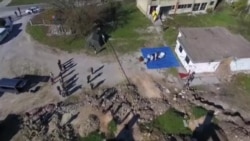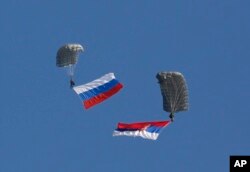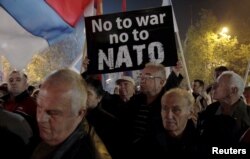As America’s European allies try to figure out their future relationships with Washington under President-elect Donald Trump, analysts say NATO and Russia are involved in an increasingly tense battle for influence in the Balkan states. Montenegro – formerly part of Serbia until declaring independence in 2006 – is about to join the NATO alliance.
There is increasing anxiety, however, over the U.S. commitment to the core principle of collective defense.
Montenegro hosted NATO exercises earlier this month as part of preparations to join the alliance in 2017. Becoming part of NATO would mark a decisive change in course for the small Balkan country, according to James Ker-Lindsay of the London School of Economics.
"At one point Montenegro was a Russian bastion, if you like, in the western Balkans; but, that’s completely changed now," said Ker-Lindsay. "Under the government of [Prime Minister Milo] Djukanovic, we saw that, in fact, Russian influence has lessened considerably. So for example, Montenegro signed up to the sanctions that were imposed against Russia following the events in Crimea."
War games
Just a few hundred kilometers away, Serbia has been hosting war games with Russia and Belarus. Moscow has made little secret of its anger at Montenegro’s decision to join NATO.
Trump has demanded that NATO allies spend more on defense — threatening that otherwise the U.S. may not come to their aid. That’s triggered deep anxiety, says Ker-Lindsay.
"Really, everything is up in the air. And unless Europe can come up with some sort of stronger response to anchor the region in, then of course I think the feeling will be that Moscow will capitalize on this," said Ker-Lindsay.
Tensions have increased following claims of an assassination plot by pro-Russian militants against Montenegro’s prime minister, Milo Djukanovic. There’s no suggestion that the Russian state was involved.
Security focus
The security jitters are compounded as the EU deals with internal tensions — first among them, losing one of its major military powers, as Britain leaves the bloc. Europe should soften the blow, says Leslie Vinjamuri of London policy group Chatham House.
"A wise policy would be for Europeans to work very hard collectively, to really strengthen and hold onto that relationship between Europe and the UK," said Vinjamuri.
Vinjamuri says she believes Trump’s approach to NATO could change rapidly if faced with a security crisis.
"I think we could see a very different strategy pursued by Donald Trump," Vinjamuri said. "And this isn’t uncharacteristic of past presidents. Remember that George [W.] Bush entered office with a very different set of policies, or at least policies that he suggested he would pursue than those that he did pursue. And that was entirely a response to the 9/11 attacks."
Analysts say Trump’s picks for top government posts — especially secretary of state — will reveal more about his foreign policy intentions.







